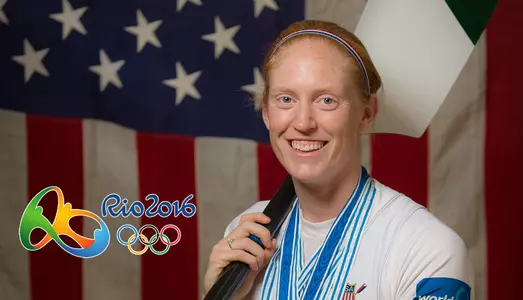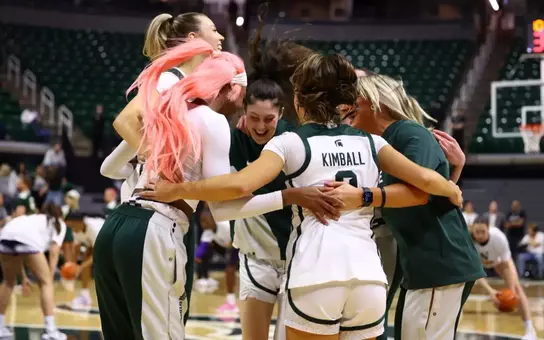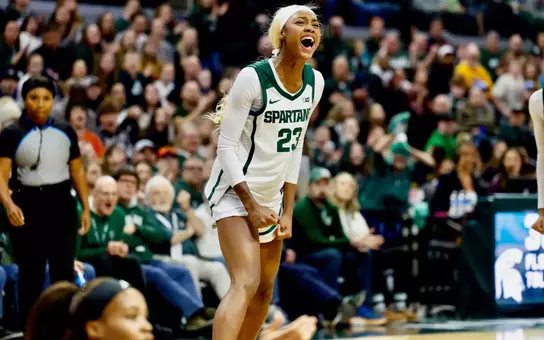Michigan State University Athletics

Grinz on Green: Rio is a Dream Realized
8/5/2016 12:00:00 AM | General
By Steve Grinczel, MSUSpartans.com Online Columnist
EAST LANSING, Mich. -- Emily Regan was eight years old when she first set her sights on competing in the Olympics. She even put her ambitious dreams on display for all to see in an autobiography she wrote as a sixth-grader in Buffalo, N.Y.
"I think it was for English class and the last chapter was about our future, and my future had me swimming in the Olympic trials and making the swim team," Regan said. "I had no idea exactly how the swim trials worked and definitely had them wrong, but that's what I had myself doing in my future."
Then, as it usually does with ambition born of innocence and daydreams, life got in the way. There was the typical teenage disenchantment and disinterest, and even a little defiance. Swimming no longer held Regan's passion, and if she wasn't going to make the U.S. Olympic team in the pool it was probably best to store whatever ideas she had about winning a gold medal in the box containing her life story.
"I sort of drifted away from swimming as I got into my high-school years because my high school didn't have a swim program," Regan said. "I was training with a USS (United States Swimming, now USA Swimming) club team, and it was really late at night, and they were really long days, and it was too much for me at that age.
"So, I drifted away from that and went through a rebellious high-school phase. I don't think I really thought much about competing in the Olympics all through high school, although ever since Atlanta, I was obsessed with following them, especially the Summer Olympics. For myself personally, it was like, `Oh, I might not compete, but I can still love them.' "
An unlikely combination of serendipity, opportunity created by Title IX and parental wisdom converged to reignite Regan's Olympic flame, but even then only reluctantly.
After being accepted for enrollment by Michigan State University, Regan attended an Academic Orientation Program with her mom, Barbara. At 6-feet-2, Regan caught the eye of MSU rowers and coaches staffing an information booth and they engaged Barbara in conversation.
"Honestly, I remember going through the activities fair but I pretty much would guarantee I was like, `Oh great, not going there,' " Regan said of the crew display. "I vividly remember my mom talking to me about it on our drive home from Michigan afterwards, but have no personal recollection of a rowing booth even being there."
When Regan returned to Michigan State to begin classes in pursuit of a hospitality business degree, she was introduced to her roommate, Lindsay Archambo, who expressed interest in joining the rowing team. On the opposite end of the height spectrum at 5-feet tall, Archambo was interested in becoming a coxswain -- the pilot of the boat -- while Regan was a ho-hum accomplice.
"I think our moms both encouraged us, and then, when I had a friend to do it with, it was, OK fine, I'll go do this with her but probably not going to stick with it," Regan said with a giggle. "I really didn't want to do it. I didn't want to be a college athlete."
Once she experienced the team environment as an unknown walk-on, however, she eventually overcame her self-imposed negativity.
"It kind of took me a while (to embrace) rowing," Regan said. "But I really enjoyed being with my teammates and I made some really great friends right from the beginning. There was early success, and my coaches were like, `You should do this,' but when I decided to stick with rowing, a lot of it was: I didn't want to let the team down."
Ten years, two Big Ten team championships, three conference varsity eight titles, All-America and all-conference honors, Big Ten Athlete of the Year accolades, one under-23 world championship, three world championships as a member of USRowing's senior national team and three World Cup titles (including the current world record, set in Lucerne, Switzerland in 2013) later, the most decorated rower in Spartan history, and one of the school's most accomplished athletes of all time, is still lifting her teammates.

Next week, she will compete with America's dynastic women's eight rowing team at the Olympic regatta in Rio de Janeiro under the watchful eyes of the towering Christ the Redeemer statue overlooking Lagoa Rodrigo de Freitas. She'll be joined at the Olympics by other former Spartan athletes, including; basketball player Draymond Green; freestyle wrestler Franklin Gomez; US women's soccer assistant coach Steve Swanson; and former Michigan State rower and MSU Clinical Center pharmacist Christie Daiss, who is a member of the U.S. medical staff at the athletes' village.
Like Green's U.S. basketball team, Regan and the women's eight are heavily favored to win the gold medal.

Gomez will wrestle for his native Puerto Rico at the Games. Gomez competed in the 2012 London Olympics for Puerto Rico in the 60 kg. freestyle division. He wrestled at Michigan State from 2005-10 and was the 133-pound National Champion in 2009, a two-time Big Ten Champion (2008, 2009), and a three-time All-American (2008, 2009, 2010).
Swanson, the current women's soccer head coach at Virginia, captained the Spartan men's soccer team in 1983.
At 28, Regan isn't old for a rower making her Olympic debut. However, reaching the pinnacle of her sport long after she once thought she'd be retired as an elite athlete, on a dominant rowing team going for an unprecedented 11th consecutive world or Olympic title, is a bit much to wrap her head around.
"I think `astonished' is a pretty good word for it," she said. "It was never on my map that rowing would be where my life would take me. Especially as I look back to when I graduated from high school, this was not at all where I would have pictured myself. I probably didn't even realize rowing was an Olympic sport.
"But being as tall as I am, and I'm a pretty athletic person in general, and having the natural physiology for rowing, and being encouraged by people from the beginning, it's been a combination of things."
Since graduating from MSU in 2010, Regan has devoted her life to her Olympic goal. She trains at the national training center in Princeton, N.J. while putting the work-a-day world on hold.
"To help support myself, I helped coach a junior rowing program for a number of years but gave that up a few years ago because I made the decision I had to focus on training if I wanted to make the team," Regan said. "I get a stipend from the U.S. Olympic Committee, but, and it's horrible to say, my parents still help me out when I need it. That's kind of one of the hardest things, knowing you're 28 and you should be self-sufficient but your parents are still helping you along.
"But they are definitely super-proud of me."
The monetary rewards may not be great, but Regan, whose father Larry, brothers Jim and Will, and sister Kelly, all played college basketball, continues to deliver returns on the emotional and financial investments made in her.
She's MSU's first rowing Olympian and the 12th-ranked rower in the world, according to World Rowing.
Not bad for a diamond-in-the-rough, who excelled in basketball, cross country and lacrosse in high school, and who came to MSU crew coach Matt Weise's attention after a chance encounter at the AOP.
"We talk to hundreds of potential athletes and try to get them to come to tryouts, and we usually have between 100-150 each year," Weise said. "We take 50 of those and it kind of dwindles down to 30 new rowers at the end of their first season.
"Emily had a certain mentality for the work, and rowing is work. It's a distance sport. A lot who walk on may have been good basketball players or swimmers, but they didn't know they were going to be great rowers until they try it. That's what we're looking for, people like Emily who were born rowers and didn't know it.
"Emily didn't know she had the lung capacity that she has."
Weise, who remains one of Regan's closest advisers and confidants, noticed her shift into another competitive gear after she joined the national program and didn't make the cut for the 2012 Olympics.
"Here's what I saw out of Emily," Weise said. "She was always gifted just from a physical sense. She had her height and her lung capacity and was pretty athletic. The first year she was at Princeton, it was more about, `They're putting me in these lineups and I don't think I deserve this.' It was a lineup she didn't necessarily want to be in.
"But what I saw out of her in the last three-four years was, `I'm going to make this happen.' I saw her take command of her performance a little bit more. Instead of saying `this is happening to me,' she took more ownership of what she was doing. Everyone in that camp is gifted enough to make the Olympic team, so then it comes down to choices they make when they're there -- are they going to seize their own training or are they going to hope it happens?
"Those who rely on hope probably aren't going to do very well and those who take command of it, like Emily did, can. She's been in the sport for 10 years and is still finding speed."
Added in 1997-98 to comply with Title IX guidelines put in place to bring women's scholarship opportunities in line with men's, MSU crew has been a steady model of success. Regan is the fifth Spartan to make the national team, but her Olympic experience can't help but give the program a lift.
"It's already doing some things for us," Weise said. "I had volleyball player in here yesterday who's looking into possibly rowing in college. I've got a picture of Emily on my wall and it's a perfect success story, right there. That's nice when you've got some examples of big dreams.
"She's not only having an impact in terms of selling a dream, but she also comes back to give back and I appreciate that."
Weise isn't nervous about the women's eight's chances of winning a third Olympic gold medal in a row.
"I will feel very excited for her and would love for those guys to row like they're capable of," he said. "If they do that, they're going to be really hard, if not impossible to beat. My hope for her is that they find their maximum speed and if they do, they're probably going to win."
Regan and her teammates are so prepared for this moment, the pressure to win is superseded by confidence.
"I would say our team is really good at understanding the fact that nobody hands you a medal at the Olympics," she said. "So we focus every day on ourselves, how we can be better and what we can do to be as fast as possible come race day, because when it comes down to racing, we have no control how the other teams are going to compete.
"And so, another one of our strengths is being super-internal and being able to work out our weaknesses and turning them into strengths. There's a lot of talk about us winning the gold medal on the outside, but it doesn't change what we're trying to do, so `compartmentalizing' is a good word for it. We want to win the gold medal, but we keep that tucked away in the back of our minds and are thinking only about what we need to get that goal -- because everybody else is trying to do that too."
Lindsey Archambo, who left MSU's crew team after one season, remains a close friend and works for her family's fire safety company in Traverse City. And not long ago, one of Regan's brothers sent her the chapter she wrote in elementary school about wanting to be an Olympian.
"There's no way I would be where I am if I hadn't rowed at Michigan State," she said. "Knowing myself, had I rowed in high school I wouldn't have continued on because I was burnt out on sports.
"I think I picked up rowing at a time that was right for me."
During the Olympics, Regan will sit in the three seat with her back to the front of the boat. Consequently, she'll be the first American to cross the finish line in each race, and when she does, she'll be wearing the necklace with an oar-shaped pendant bearing the block "S" she received as a departing Spartan senior.
"I always have that with me when I race," Regan said. "It's pretty cool to represent MSU at the Olympics."




